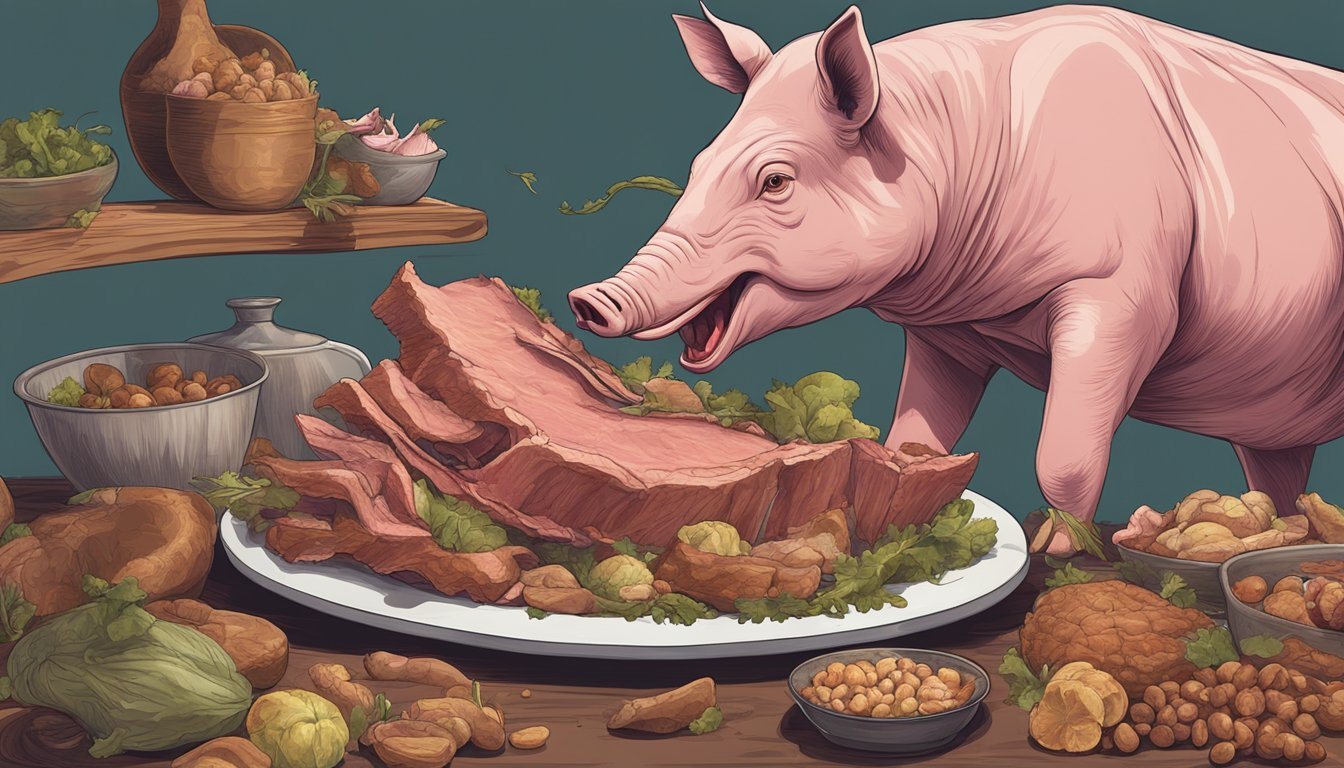Pork Nutritional Value Carnivore Diet
Essential Insights and Benefits
Pork has often been debated among enthusiasts of the carnivore diet, but there’s no denying its nutrient-dense profile. Pork provides an array of vital nutrients such as niacin, vitamins B6, and magnesium, which are essential for maintaining optimal health. When sourced from pasture-raised animals, pork can be a nutritious and flavorful addition to the carnivore diet.
Those following the carnivore diet benefit from a regimen focused strictly on animal-based foods, ensuring they get ample proteins and fats while avoiding plant-based items. Pork, including cuts like pork belly, offers a savory and tender option that aligns perfectly with this dietary approach. The diet primarily includes various meats, eggs, and dairy products, all of which contribute to a balanced intake of necessary nutrients.
While conventional pork does have a higher omega-6 content, which some suggest could be inflammatory, the advantages of consuming high-quality, pasture-raised pork make it a valuable part of the carnivore diet. This choice not only supports a diverse nutrient intake but also promises delicious, satisfying meals for those committed to an animal-based lifestyle.
Understanding Pork in the Carnivore Diet
Pork offers a nutrient-dense option for those following a carnivore diet, providing essential proteins, healthy fats, vitamins, and minerals. Its value as a primary protein source and its comparison with other meats like chicken and beef will be examined.
Pork as a Primary Source of Protein
Pork is a rich source of high-quality protein, which is crucial for muscle repair and growth. A 100g serving of pork contains around 25g of protein. This high protein content makes pork an effective food for maintaining muscle mass and supporting physical performance.
Additionally, pork contains all nine essential amino acids required by the body, making it a complete protein. This is particularly beneficial for those on a carnivore diet, which emphasizes animal-based nutrition. The amino acid profile of pork supports various bodily functions, from tissue repair to immune function.
Comparison with Other Meats
When compared to other meats like chicken and beef, pork stands out for its balanced nutrient profile. Beef is often praised for its iron content while chicken is known for being a lean protein source. Pork, on the other hand, offers a middle ground with a moderate fat content and a range of vitamins and minerals.
Nutritional Comparison (per 100g):
Meat Protein Fat Iron (mg) Vitamin B6 (mg) Pork 25g 14g 1.1 0.6 Beef 26g 15g 2.6 0.4 Chicken 31g 3.6g 0.9 0.5
Pork provides a higher amount of vitamin B6 compared to beef and chicken, which is essential for brain health and energy production.
The Role of Fats in Pork
The fat content in pork varies depending on the cut, with pork belly and shoulder being higher in fat compared to leaner cuts like tenderloin. Fat is a crucial component of the carnivore diet, serving as a primary energy source.
A 100g portion of pork belly contains approximately 30g of fat, making it an energy-dense choice. These fats include both saturated and monounsaturated fats, which are important for hormone production and cell function. The presence of fat also enhances the absorption of fat-soluble vitamins like A, D, E, and K.
Vitamins and Minerals in Pork
Pork is not just a protein and fat source; it also delivers a variety of essential vitamins and minerals. Notably, pork is rich in vitamins B1, B2, B6, and B12, which support energy metabolism, red blood cell formation, and neurological functions.
Key minerals found in pork include iron, magnesium, phosphorus, and zinc. Iron from pork, although lower than beef, is highly bioavailable and aids in oxygen transport and enzyme function. Zinc supports immune health and wound healing, while phosphorus is necessary for bone health.
Incorporating pork into the carnivore diet ensures a broad spectrum of nutrients necessary for maintaining health and well-being.
Health Impacts of a Carnivore Diet
The carnivore diet, involving the exclusive consumption of animal-based foods, has its proponents and critics. It is essential to understand both the potential benefits and associated risks to make informed dietary choices.
Potential Benefits
Advocates of the carnivore diet claim notable benefits, particularly for metabolic health. Some studies and anecdotal reports suggest improvements in conditions like obesity and type 2 diabetes by stabilizing blood sugar levels.
Additionally, individuals on this diet often report decreased inflammation and improvements in autoimmune and inflammatory conditions. Reduced intake of carbohydrates and processed foods may contribute to these effects, promoting a healthier inflammatory response.
Certain mental health improvements are also reported. Enhanced focus, mood stabilization, and better mental clarity are common experiences due to reduced sugar and refined carbohydrate intake.
Risk Factors and Considerations
Despite potential benefits, the carnivore diet poses significant risks, especially concerning heart health. Consuming high amounts of saturated fats from fatty meats can elevate cholesterol levels, increasing the risk of heart disease.
Nutrient deficiencies can arise from excluding fruits, vegetables, and other plant-based foods. Critical vitamins such as vitamin C and dietary fiber, essential for digestive health, may be lacking.
Furthermore, long-term adherence to this diet might lead to kidney strain due to high protein intake. Individuals with pre-existing kidney issues should exercise particular caution.
Lastly, restrictive diets can impact social and psychological well-being, as they often limit food choices and the ability to participate in communal eating practices.
If you're looking for vitamin C and fiber, buying it online is your best bet!
Technical Aspects of Carnivore Diet Implementations
Technical considerations are crucial for those interested in a carnivore diet, particularly when transitioning and ensuring dietary variety to maintain nutritional completeness.
Transitioning to a Carnivore Diet
Transitioning to a carnivore diet involves shifting from a diet that includes carbohydrates and plant-based foods to one focused solely on animal products.
The transition period may involve some adaptation issues like digestive changes, often referred to as "keto flu," due to the body adjusting to a low-carb, high-fat intake. Gradual reduction of carbohydrates can ease this transition.
Many individuals start with a variety of meats including beef, pork, lamb, and poultry. They might also consume organ meats to boost nutrient intake. Fats, such as those found in pork, are necessary to meet daily energy requirements.
Dietary Variety and Nutritional Completeness
Despite being a restrictive diet, variety within the carnivore paradigm is essential for nutritional completeness. Pork offers valuable nutrients like thiamin, niacin, and vitamin B6, contributing to a balanced intake when combined with other meats.
Organ meats such as liver provide crucial vitamins and minerals like vitamin A and iron. Including different parts of the animal ensures a broad spectrum of nutrients.
Monitoring nutrient intake, particularly for nutrients less abundant in meat, such as certain vitamins and omega-3 fatty acids, is important. Supplementation may be necessary to avoid deficiencies. Integrating a range of animal products helps to offset the restrictive nature of a carnivore diet.
Sources of Pork and Their Nutritional Differences
Pork is a popular choice in the carnivore diet for its rich protein and essential nutrients. This section explores pasture-raised versus conventional pork and highlights the nutritional significance of pork belly and bacon.
Pasture-Raised Versus Conventional Pork
Pasture-raised pork is often perceived as healthier. These animals are raised in open pastures, and their diet is more natural, leading to higher levels of omega-3 fatty acids and antioxidants. The meat from pasture-raised pigs may also have a more robust flavor due to their varied diet.
In contrast, conventional pork typically involves raising pigs in confined spaces with a grain-based diet. This method can result in higher levels of omega-6 fatty acids and a less favorable fatty acid profile. Though both contain essential nutrients like protein, B vitamins, zinc, and iron, the nutritional quality of pasture-raised pork tends to be superior.
The Significance of Pork Belly and Bacon
Pork belly is a highly nutritious option. It is rich in healthy fats, particularly when sourced from pasture-raised pigs. It provides essential nutrients like niacin, vitamin B6, and magnesium. Due to its high-fat content, pork belly is an ideal choice for those on a carnivore diet seeking a high-fat, moderate-protein food.
Bacon, derived from pork belly, shares many of the same nutritional benefits. However, it's important to consider the curing process. Some bacon might contain additional sodium and preservatives. When choosing bacon, it’s beneficial to opt for minimally processed, nitrate-free options to maximize nutritional value while mitigating potential health risks.
Both pork belly and bacon offer versatility and richness in a carnivore diet, making them valuable protein sources.
The Carnivore Diet in Context
The carnivore diet focuses exclusively on animal products, excluding all plant-based foods such as fruits and vegetables. By comparing this diet to others, one can understand its distinct benefits and limitations.
Comparison with Other Diets
The carnivore diet is unique in its strict exclusion of plant-based foods. Zero-carb intake characterizes it, with an emphasis on high-fat, protein-rich foods like beef and pork.
In contrast, traditional diets, including fruits and vegetables, aim for a balanced intake of carbohydrates, proteins, and fats. Ancestral diets included a mix of both plant and animal-based components, suggesting varied nutritional sources.
Keto and Paleo diets, though heavy on animal-based foods, still incorporate some plant-based foods. Keto allows low-carb vegetables, while Paleo includes fruits and vegetables, aligning more closely with ancestral eating habits than the strict carnivore approach.
This steadfast focus on animal-based products in the carnivore diet challenges common nutritional practices, beckoning individuals to reevaluate dietary needs.
Remaining Considerations for Optimal Health
To achieve and maintain optimal health on a carnivore diet, it's essential to include a variety of nutrient-dense animal products, understand the balance of fats and fatty acids, and practice moderation.
Inclusion of Organs and Other Animal Products
Integrating organ meats like beef liver into the carnivore diet can significantly enhance nutrient intake. Beef liver is rich in vitamins A, D, and B-complex vitamins.
Organ meats provide minerals such as iron, zinc, and copper, which are less abundant in muscle meats alone. Including diverse meats such as lamb, fish, and shellfish adds nutrients like iodine and selenium. Omega-3 rich fish like salmon and sardines are beneficial for their anti-inflammatory properties.
Navigating Fats and Fatty Acids
Understanding the balance between omega-3 and omega-6 fatty acids is crucial on a carnivore diet. While pork is nutrient-dense, it generally has a higher omega-6 to omega-3 ratio compared to beef and lamb.
Including fatty fish such as salmon and sardines can enhance omega-3 intake, contributing to better heart health and reduced inflammation. Utilizing animal fats, such as those from beef tallow and pork lard, provides essential fatty acids and aids in nutrient absorption.
Maintaining Balance and Moderation
Maintaining balance and moderation in the diet ensures all necessary nutrients are consumed without excess. While red meats and organ meats are nutrient-rich, incorporating a variety such as eggs and dairy adds different protein sources and nutritional benefits.
Eggs offer choline and vitamins essential for brain health. Dairy provides calcium and vitamin D for bone health. Both must be consumed in moderation, adjusting quantities based on individual health goals to prevent potential imbalances.
Regularly rotating protein and fat sources while keeping portion sizes balanced helps sustain a diverse and nutritionally complete carnivore diet.








